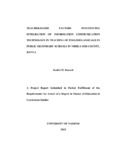| dc.description.abstract | ntegration of Information Communication Technology in teaching English
language in public secondary schools is dependent on various related factors. The
purpose of this study was to establish teacher-based factors influencing
integration of ICT in teaching of English language in public secondary schools in
Vihiga sub-county, Kenya. The study was guided by the following objectives:
determining influence of teachers’ gender, ICT competency, attitude and
workload on ICT integration in teaching of English language. The study was
guided by the Rand Change Agent Theory of curriculum implementation. A
descriptive survey design was adopted, utilizing both qualitative and quantitative
research methods. The study targeted population was 109 participants comprising
of 26 Head teachers, 26 Heads of Department, and 57 Teachers of English. A
sample size of 67 participants was sought using purposive and random sampling
technique. Data collected using two types of instruments; questionnaire for
teachers of English and English Heads of Department while interview schedule
was used for head teachers. Data were analyzed using both descriptive and
inferential statistics. Gender was established to have no significant influence on
integration of ICT in teaching Enlish. Teachers’ attitude was established to be one
of the main factors influencing integration of ICT in teaching, most teachers had a
negative attitude towards ICT. On ICT competency, many teachers were found to
have inadequate skills for ICT integration. Teachers’ workload was a barrier to
effective ICT integration, all the teachers under study indicated having a high
number of lessons per week, an indicator of overload. From the findings, the
study concluded that teacher’s gender did not influence integration of ICT in
teaching of English. On ICT competency, the study concluded that majority of
teachers of English did not have the required knowledge and skills needed for
effective integration of ICT in teaching English. Teachers positive attitude was
concluded to be one of the main factor influencing integration of ICT in teaching
English, for a positive attitude led to frequent ICT integration unlike a negative
one. Teachers workload affected integration for the lesser the number of lessons
per week the more frequent ICT could be integrated while the higher the number
of lessons per week the lesser the integration of ICT in teaching English. The
study therefore recommended for equal opportunities and utility of ICT
equipment to both teachers’ gender. A recommendation was made for there to be
frequent capacity building courses for in-service teachers as well as intensifying
pre-service training in ICT matters. A recommendation was done for school
administrators to create a conducive working atmosphere that motivated teachers
of English integrate ICT in their teaching. The study recommended for hiring of
more teachers to reduce teachers’ lesson load. The study also recommended that
further research be carried out focusing on students to establish their views on
ICT integration in learning. Final recommendation was on the study being carried
out in other selected parts across the country as the study was only carried in
Vihiga sub-county. | en_US |

